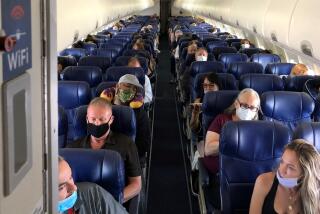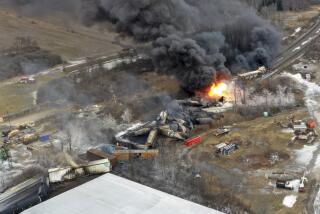Screening for terror
People who see the glass as half full will regard the foiling of last weekâs international bomb plot as a triumph for counter-terrorism efforts. After all, it was the combination of a tip from Saudi Arabian intelligence services and fast action from U.S. officials that thwarted what is believed to be Al Qaedaâs first attempt to deliver a bomb using the mail. But those of a more pessimistic bent will point out that the terrorists sought to conceal the explosives in air cargo simply because security has been tightened for passengers. In other words, as soon as the government reacts to an attack by tightening up in one area, the bad guys will find a weakness somewhere else to exploit.
We suspect the latter point is lost on Rep. Edward J. Markey (D-Mass.), who was quick to propose a bill requiring that 100% of freight on cargo planes be screened. âIt is time for the shipping industry and the business community to accept the reality that more needs to be done to secure cargo planes so that they cannot be turned into delivery systems for bombs targeting our country,â he said in a statement. That sounds good, but itâs not easy to implement. Markey introduced a bill approved by Congress in 2007 requiring that, by August 2010, all cargo on passenger planes be inspected. While the Transportation Security Administration has made progress in achieving the goal, itâs still a long way from succeeding, according to a June report by the Government Accountability Office â and when it comes to cargo on passenger planes arriving from foreign countries, the TSAâs guess that about 50% is being screened is based on âestimates rather than actual data as required by law,â the GAO says.
The main problem is that the U.S. canât compel foreign countries to screen cargo. And when it comes to expanding the screening from passenger planes to cargo planes, the complexities mount; it might be impossible to screen every package at airports because the volume of international air freight is so great, meaning some of the screening would have to be done by factories and/or shippers, yet that presents opportunities to tamper with the packages after theyâve been checked. This isnât to suggest that itâs pointless to try to tighten cargo security, only that putting up an impenetrable net is likely to prove impossible. And if cargo planes become more difficult targets, terrorists will simply shift to trains, buses or container ships.
For lawmakers, the challenge of combating terrorism is to balance the size and nature of the threat against the costs of reducing it and the effects on international commerce â a feat that becomes harder to achieve in the emotional wake of a bombing, failed or otherwise. Weâre all for increased vigilance and plugging security holes, but reacting to the last attack without focusing on the next one wonât work.
More to Read
Sign up for Essential California
The most important California stories and recommendations in your inbox every morning.
You may occasionally receive promotional content from the Los Angeles Times.










